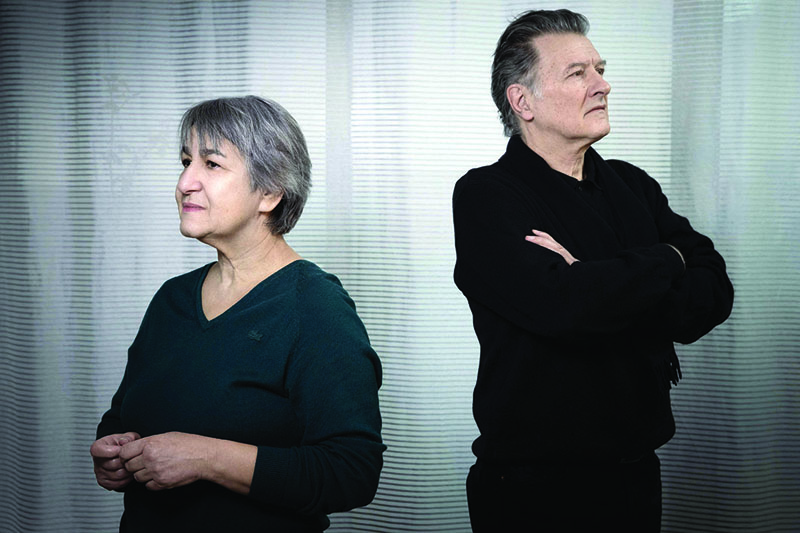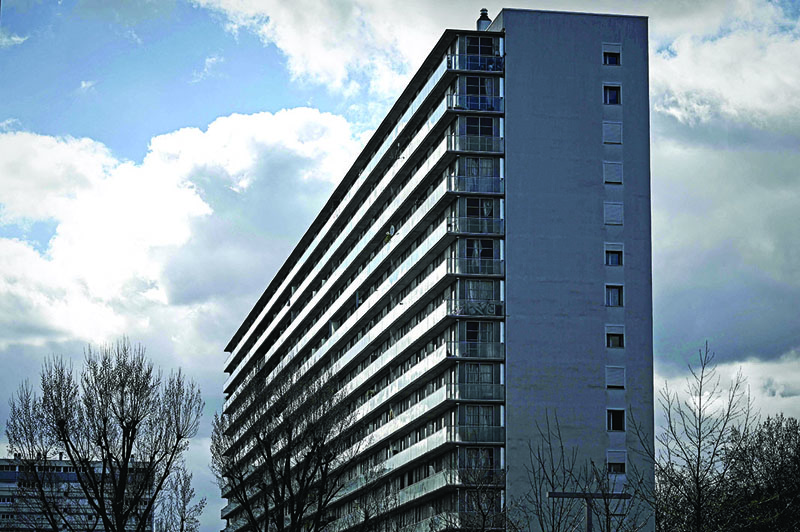 French architects Anne Lacaton (left) and Jean-Philippe Vassal (right) pose at their workshop in Montreuil, east of Paris.-AFP photos
French architects Anne Lacaton (left) and Jean-Philippe Vassal (right) pose at their workshop in Montreuil, east of Paris.-AFP photosThe Pritzker Prize-architecture's most prestigious award-was awarded Tuesday to French duo Jean-Philippe Vassal and Anne Lacaton for their affordable, eco-friendly spaces that prioritize the well-being of the many. Vassal, 67, and Lacaton, 65, received the accolade-which was first awarded in 1979 and comes with $100,000 in prize money-for their work transforming urban housing into uplifting and sustainable spaces on modest budgets. "The modernist hopes and dreams to improve the lives of many are reinvigorated through their work that responds to the climatic and ecological emergencies of our time, as well as social urgencies, particularly in the realm of urban housing," said the jury.
Vassal and Lacaton "accomplish this through a powerful sense of space and materials that creates architecture as strong in its forms as in its convictions, as transparent in its aesthetic as in its ethics," the jurors added. The Parisian architects-who won France's national architecture prize in 2008 -- made names for themselves with "Maison Latapie," a stand-alone family home built in 1993 in Floirac, near Bordeaux, that has become emblematic of accommodation that is spacious and inexpensive. Vastly different to a traditional suburban home, the back of the house resembles a shed: retractable and transparent polycarbonate panels bathe the house in natural light, making the rooms feel larger while also facilitating climate control.
 A photograph shows a view of the social housing complex "Grand Parc" built in the 1960s and which 530 dwellings were rehabilitated between 2014 and 2017 by the Lacaton and Vassal architect agencies.
A photograph shows a view of the social housing complex "Grand Parc" built in the 1960s and which 530 dwellings were rehabilitated between 2014 and 2017 by the Lacaton and Vassal architect agencies.The project marked the first time they applied greenhouse technology with the installation of a winter garden. Systems derived from horticulture are "extremely intelligent for playing with the sun or the climate, in terms of ventilation or solar supply," said Vassal. The pair, who got to know each other at the Bordeaux School of Architecture, from which they graduated in 1980, is also honored for also having "proposed an adjusted definition of the very profession of architecture."
Vassal and Lacaton, who credit architecture in African countries with inspiring their idea of spacious affordable homes, favor transforming and improving existing housing in an urban environment rather than replacing old buildings with new ones. "It's so violent, so dreadful to have lived somewhere for 10 years and suddenly to see a house disappear in which a friend, a neighbor has existed," said Vassal. "So we can keep people there, and from what already exists produce housing that the standard is unable to produce to the same level of quality, spending half the money," he added.
Pandemic
The duo applied that principle in 2011 to the Tour Bois Le Pretre, a collection of about 100 housing units built in Paris in the early 1960s. In collaboration with Frederic Druot, Lacaton and Vassal increased the surface area and improved the comfort of the apartments by removing the original concrete facade and adding heated extensions, winter gardens and bioclimatic balconies. Faced with developers aiming to capitalize on the surge in prices per square meter, Lacaton says she and Vassal try to promote the idea that space impacts quality of life, and peaceful coexistence between family members and with neighbors.
The pandemic has reinforced their approach, with people spending a lot more time at home. "We have seen, in the buildings where we have made changes, extremely tense family situations, because the space itself was too constrained," said Lacaton. "When we manage to loosen that up, to give more space to everyone, situations relax, people get creative, more open, they invite the neighbors, they invite the children's friends."
The pair haven't just applied their approach to enhancing living spaces: their renovation of the Palais de Tokyo, completed in 2012, transformed the Paris museum into a huge contemporary art museum. Lacaton becomes the sixth woman to win the Pritzker in its more than 40-year history. Anglo-Iraqi Zaha Hadid was the first in 2004. Last year, Dublin-based Yvonne Farrell and Shelley McNamara became the first female duo to scoop the award. - AFP









